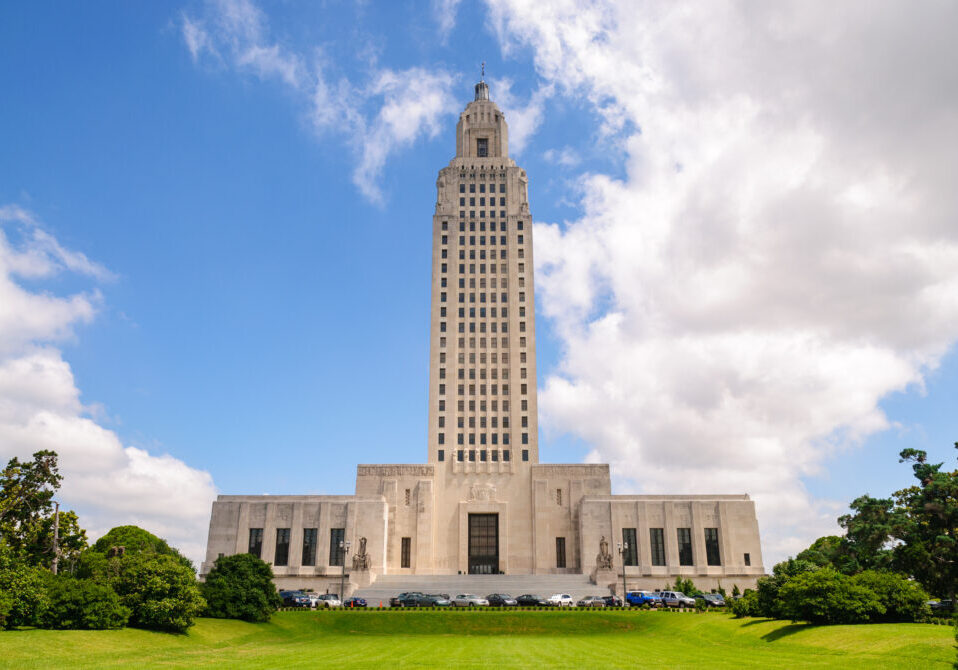Louisianans would pay more sales tax on most purchases in exchange for a reduction in their state income taxes under a deal hashed out behind closed doors by state lawmakers that could steer Gov. Jeff Landry’s complicated tax-swap scheme across the finish line on Friday. The reworked plan calls for replacing Louisiana’s graduated income tax structure for individuals and corporations with flat rates of 3% and 5.5%, respectively, along with tripling the standard deduction for individual filers. The cost of those tax cuts will be partially offset by temporarily increasing the state sales tax, which falls hardest on low-income households, from 4.45% to 5%. The Times-Picayune | Baton Rouge Advocate’s Tyler Bridges reports:
Louisiana already has the country’s highest combined local and state sales tax rate at 9.56%. This would push it to 10.06%. Lawmakers also would repeal the corporate franchise tax, which is a tax on corporate assets. The plan overall would reduce state taxes and give the biggest dollar savings to the wealthy and large corporations, with Landry saying this will spark an investment boom that will raise family income and reverse Louisiana’s population loss of recent years.
Many anti-tax Republicans would not support the move to increase Louisiana’s highest-in-the-nation sales tax further, which meant the governor had to rely on bipartisan support to advance his plan. But as the Louisiana Illuminator’s team explains, Democrats received nothing concrete, only “assurances” and “maybes,” for throwing support behind a package that makes Louisiana’s tax system more regressive.
[Senate Democratic Caucus Chairman Gerald] Boudreaux said Democrats were given some concessions for agreeing to support Landry’s tax package. They were assured certain health care services wouldn’t be cut, and funding for early childhood education and juvenile vocation programs would be prioritized, he said. The state funding formula for higher education might also be reworked to direct more support to Louisiana historically Black colleges and universities, according to Boudreaux.
Retirees struggle to afford insurance
Skyrocketing insurance premiums are pricing many elderly Louisianans out of their homes. Others are being forced to severely water down their policies or drop coverage altogether. The Times-Picayune | Baton Rouge Advocate’s Sam Karlin reports on the toll that the state’s homeowner’s insurance crisis is having on retirees and senior citizens.
As home and flood insurance costs spike in risk-prone areas around the country, the toll is hitting elderly Louisianans and people on fixed incomes particularly hard. And Louisiana is aging faster than almost any other state, as young people flee and older residents stay put as they age. The collision of those trends is revealing an ugly truth about south Louisiana: for many, it’s an increasingly difficult place to grow old.
Lax regulations drive plastic pollution in Louisiana
Plastic plants in the United States, and especially in Louisiana, have allowed harmful pollutants to flow into waterways because of lax oversight from the U.S. Environmental Protection Agency. That’s the conclusion of a new report from the Environmental Integrity Project, a nonprofit group that advocates for more effective enforcement of environmental laws. The Louisiana Illuminator’s Elise Plunk reports:
“The current federal regulations are outdated and have left downstream communities vulnerable to harmful and poorly controlled pollution released by the plastics industry,” said Kira Dunham, research manager at the Environmental Integrity Project and lead author of the report, during a Nov. 14 online news conference. The report also highlights the lack of accountability when even lax regulations are violated. Nearly 83% of all the plants examined in the report violated permitted pollution limits at least once from 2021 to 2023, according to self-reported company data in EPA records. Only 14% of these plants faced financial penalties.
The impact of Trump’s tariffs
President-elect Donald Trump has vowed to enact massive new tariffs on importers when he enters the White House. Economists agree that these tariffs, which would be paid by U.S. importers, not foreign countries, would lead to higher prices and interest rates for consumers. New analysis from the Institute on Taxation and Economic Policy break down the impact of Trump’s tariffs by income group:
- For the poorest fifth of Americans, who will have incomes of less than $29,000 in 2026, the tariffs will impose a tax increase equal to 5.7 percent of their income that year.
- For the middle fifth of Americans, who will have incomes between $55,000 and $94,000 in 2026, the tariffs will impose a tax increase equal to 4.6 percent of their income.
- The richest 1 percent, who will have incomes of more than about $915,000, will face a smaller tax increase relative to their income, just 1.4 percent.
Number of the Day
10.06% – Louisiana’s combined state and average local sales tax rates under proposals that the Louisiana Legislature is expected to advance on Friday. This move would increase Louisiana’s highest-in-the-nation’s sales tax even further. (Source: The Times-Picayune | Baton Rouge Advocate)
